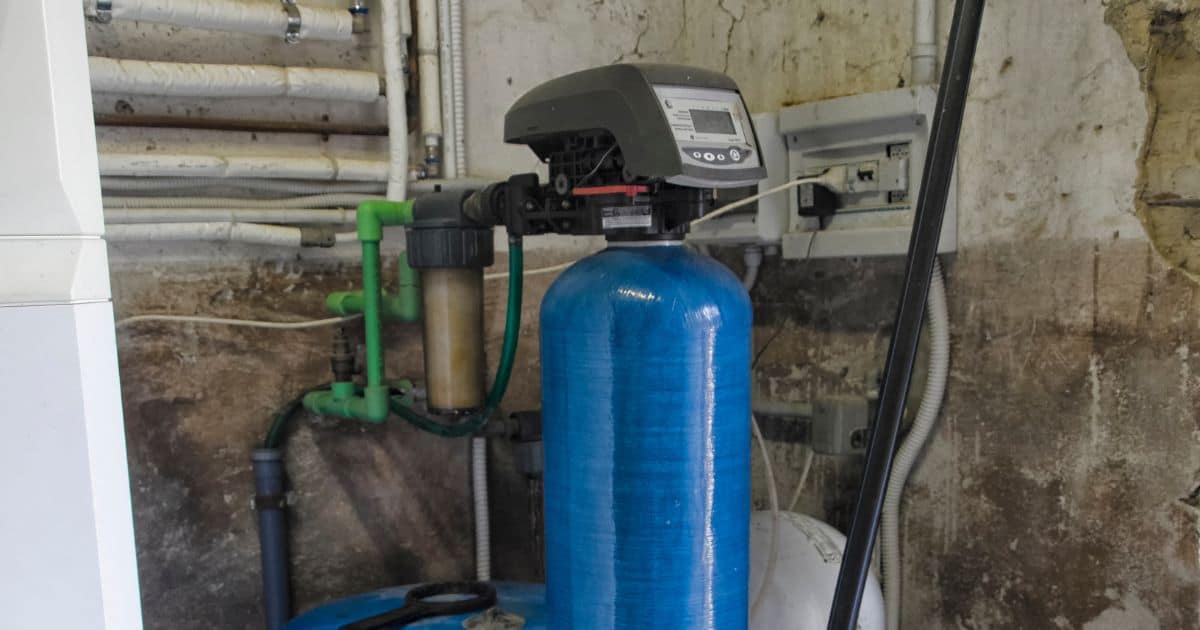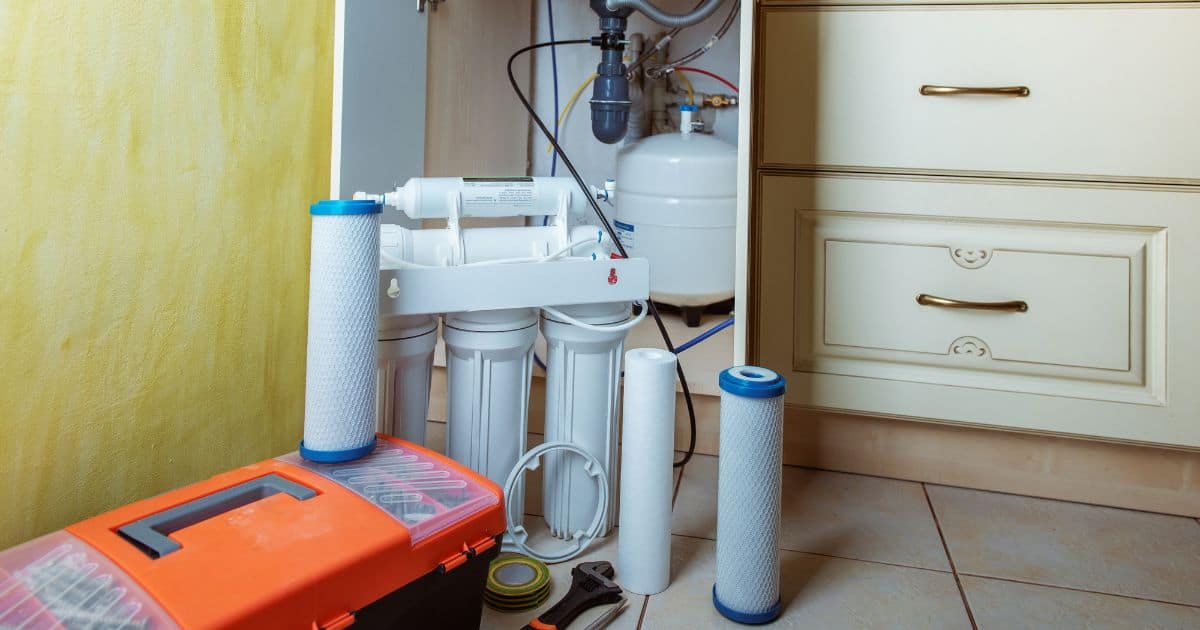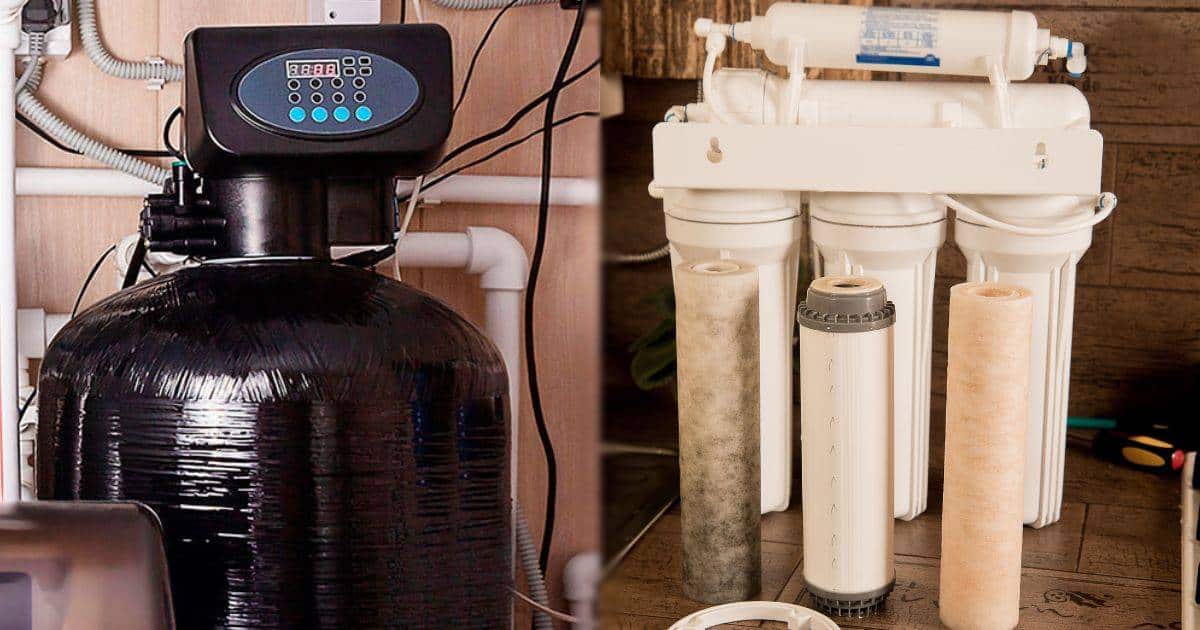We like to share product recommendations with you and hope you like them! Just to make you aware Water Filter Data may collect a small share of sales or other compensation from the links on this page.
The debate between water softeners and filters has been going on for years. There are many things to consider when choosing which one you want (or need) to use. In this post, we’ll go over water softeners vs. water filters, their main differences, and give you some important pointers so you can make your decision based on what’s important to you.
Water Softeners vs. Water Filters
What Is a Water Softener?

A water softener is a device that is used to remove hardness from water. Hard water contains a high concentration of minerals, such as calcium and magnesium. These minerals can cause a variety of problems, such as scaling on plumbing fixtures and appliances. It can even make clothes feel stiff and scratchy. A water softener works by exchanging the hard minerals in water for softer ones, such as sodium or potassium. This process is known as ion exchange.
Water softeners are usually installed at the point where water enters the home, such as at the main water supply line. This ensures that all of the water in the home is softened, which can be important for homeowners who have hard water. Water softeners can be purchased in a variety of sizes, depending on the needs of the home. They are also available in both salt-based and salt-free models.
Benefits of a Water Softener
Are you wondering if a water softener is right for your home? There are many benefits to using a water softener, including reducing the amount of soap needed for cleaning, extending the life of your plumbing fixtures, and improving the taste of your water.
If you have hard water, it can be difficult to get your dishes and clothing clean. Soap doesn’t lather as well in hard water and can leave behind a film. A water softener will help to remove the minerals that cause hard water, making it easier to get your dishes and clothes clean.
Hard water can also damage your plumbing fixtures and appliances. Over time, the mineral deposits can build up and cause clogs or breaks. A water softener will help to protect your appliances and fixtures by removing these deposits.
Downsides to Water Softeners
Water softeners have a few potential downsides. One is that they can add sodium to your water, which is not ideal if you are on a low-sodium diet. They can also be expensive to maintain and operate, and they require regular servicing. Finally, water softeners can sometimes remove beneficial minerals from your water along with the harmful ones.
What Is a Water Filter?

A water filter is a device that is used to remove impurities from a liquid or gas. Filters are used in a variety of applications, including air and water filtration. There are many different types of filters, each designed to remove specific impurities.
Water filters are designed to remove impurities from water, such as dirt, sediment, and chlorine. There are many different types of water filters, including whole-house filters, point-of-use filters, and reverse osmosis systems.
Water softeners are devices that are used to remove minerals from hard water. Hard water is water that contains high levels of minerals, such as calcium and magnesium. Water softeners work by exchanging the minerals in hard water for sodium ions. This process is known as ion exchange.
How Does a Filter Work?
A water filter is a mechanical or chemical device that is used to remove impurities from water. The most common type of water filter is the activated carbon filter, which is used to remove chlorine, taste, and odor from drinking water.
Benefits of a Filter
There are many benefits to having a water filter in your home. One of the most important benefits is that it can help to remove harmful contaminants from your water. This can include everything from bacteria and viruses to lead and other metals. Having clean, filtered water can help to improve your overall health and well-being.
Another benefit of water filters is that they can help to improve the taste of your water. If you have ever tasted the water that has been filtered, you know that it can taste significantly better than water that has not been filtered. This is because filter systems remove many of the impurities that contaminate the water and cause it to taste bad.
Finally, using a water filter can also save you money. This is because you will no longer need to purchase bottled water. Bottled water can be expensive, and it is not always necessary if you have a good filtration system in place. You may even find that you save money on your monthly water bill after switching to a filtered system.
What Are Some Downsides to Water Filters?
While water filters are great at removing impurities from your water, they have a few downsides. First, they can be expensive to maintain. Second, they can remove important minerals from your water, making it less healthy to drink. Finally, they can clog over time, requiring more frequent maintenance.
Water Softeners vs. Water Filters: Which One to Install

When it comes to deciding whether to install a water filter or a water softener in your home, there are several factors that you will need to take into account. The first is the hardness of your water. This is important because the harder your water is, the more likely it is that you will need a water softener. A water softener is probably your best option if you have very hard water. A water filter may be sufficient if you have only moderately hard water.
Another factor to consider is the cost of each type of system. For example, water softeners are more expensive than water filters, so this may be your deciding factor. It is essential to remember that a water softener will save you money in the long run by preventing damage to your pipes and appliances.
Finally, you will need to decide what type of maintenance you are willing to do in each kind of system. For example, water softeners require occasional regeneration with salt, which some people may not be comfortable with. On the other hand, water filters typically require less maintenance, but they may need to be replaced more frequently than a water softener.
Ultimately, deciding between a water filter and a water softener depends on your needs and preferences. Both are great options to get the water quality you need in your home.
Frequently Asked Questions
Do I need to get both a water softener and filter or will one do the job?
There’s no easy answer to this question since it depends on your specific needs and concerns. For example, if you’re worried about hard water and contaminants in your water, you’ll need to get a water softener and filter. However, if you’re only concerned with one or the other, you can get away with just one device.
Which type of water softener do you need for your home?
There are a few different types of water softeners on the market, and each has its own benefits. If you’re unsure which type of water softener is right for your home, read on to learn more about the different kinds of water softeners and how they can benefit your home.
One type of water softener is salt-based water softener. This water softener uses salt to remove minerals from your water, making it softer and easier on your skin and hair. Salt-based water softeners are typically more expensive than other water softeners, but they’re also more effective at removing minerals from your water.
Another type of water softener is the potassium-based water softener. This water softener uses potassium to remove minerals from your water, making it softer and easier on your skin and hair. Potassium-based water softeners are typically less expensive than salt-based water softeners, but they’re not as effective at removing minerals from your water.
The last type of water softener is the magnetic water softener. This type of water softener uses magnets to remove minerals from your water, making it softer and easier on your skin.
Conclusion
When it comes to water softeners vs. water filters, which one should you get? The answer depends on your needs and preferences. If you’re looking for a way to improve your water quality, then a water filter is the way to go. A water softener is the better option if you’re mainly concerned with hard water and the build-up of minerals in your pipes. Whichever route you choose, make sure to do your research so that you can find the best possible solution for your home.

Wayne is a water quality expert – The founder of Water Filter Data. He has a degree in microbiology and his field of expertise is drinking water. His goal is to allow for clean and healthy water for as many people as possible.



